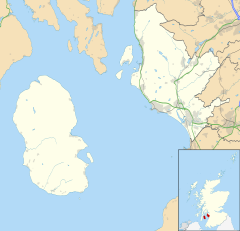Kilwinning
Kilwinning
|
|
|---|---|
 Kilwinning Abbey |
|
| Kilwinning shown within North Ayrshire | |
| Population | 21,693 (2014) |
| OS grid reference | NS2943 |
| • Edinburgh | 65 miles (105 km) |
| • London | 379 miles (610 km) |
| Civil parish |
|
| Council area | |
| Lieutenancy area | |
| Country | Scotland |
| Sovereign state | United Kingdom |
| Post town | KILWINNING |
| Postcode district | KA13 |
| Dialling code | 01294 |
| Police | Scottish |
| Fire | Scottish |
| Ambulance | Scottish |
| EU Parliament | Scotland |
| UK Parliament | |
| Scottish Parliament | |
Kilwinning (from Scottish Gaelic: Cill Fhinnein) is a town in North Ayrshire, Scotland. It is on the River Garnock, north of Irvine, about 21 miles (34 km) south of Glasgow. It is known as "The Crossroads of Ayrshire". Kilwinning was also a Civil Parish. The 2001 Census recorded the town as having a population of 15,908. At the 2011 Census, Kilwinning had a population of 21,456
According to John Hay, once the headmaster of the parish school in Kilwinning, "North Ayrshire has a history of religion stretching back to the very beginning of missionary enterprise in Scotland. The Celtic Christians or Culdees of the period of St Columba and St Mungo found here, in this part of Scotland, a fertile field for the propagation of the faith. Kilmarnock, Kilbride, Kilbirnie, are all, like Kilwinning, verbal evidence of the existence of 'Cillean' or cells of the Culdee or Celtic Church."
In the distant past, the town was called Sagtoun, or Saint’s Town, after St. Winning, the founder of an early seventh century church on this site. However, the actual identity of St. Winning is unclear. Some scholars have associated him with the Irish saint known as St Finnian of Moville, who died in the late sixth century. Others believe he was a Welshman by the name of Vynnyn, and the Aberdeen Breviary of 1507 asserts that he was from Scotland. The work of Professor Owen Clancy of the University of Glasgow in 2001 makes another identification possible. Clancy argued that, in fact, Saint Ninian and Saint Finnian were the same person, the difference being attributed to an error on the part of a medieval scribe. If that is so, then Ninian, who was a missionary to the Picts in Scotland, and Winning, who was deemed a Scotsman in the Aberdeen Breviary, could theoretically be one and the same as the Irishman named Finnian.
...
Wikipedia

